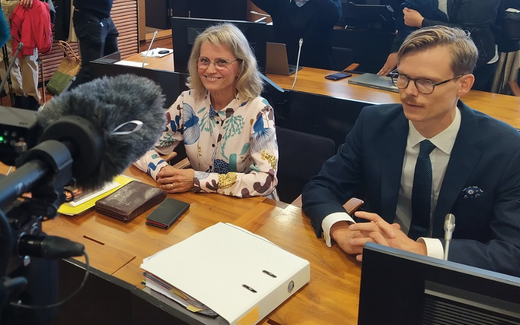No need for persecution nowadays

Some fear that it will soon no longer be allowed to speak out against the LGBT community. Activists protest in Kyiv a bill that criminalises doing so. Photo EPA, Sergey Dolzhenko
Opinion
In our society, the iron fist of old-fashioned tyranny has given way to the velvet-gloved despotism of overbearing government. The techniques applied are proving to be every bit as effective as the old thuggery.
If you skip past this piece with a sigh—perhaps even with annoyance—I won’t take it amiss. Persecution? In the Netherlands? Doesn’t such a claim indicate irrationalism, over-dramatisation and self-centredness, a scourge that has already wrecked society enough? We’re doing fine, we’re privileged people, we have our liberty and our freedoms; isn’t it at the very least a bit pathetic to drone on about persecution, the threat of jail or worse? Persecution is something that happens in faraway countries (and we Dutch set up the organisation Open Doors to take care of the problem), or is part of the past, and narratives of it should be confined to the romantic thrill of our childhood reading.
Yet perhaps something really is afoot: something that may even be worse than the brutality of history’s waves of physical persecution. I’d like to take that as my theme.
Rule of law
By way of prefatory remarks, I am by this stage of the opinion that there is no shortage of Dutch Christians who have worked out that contemporary persecution is anything but imaginary. We see them soaking up accounts of the saints in trouble in olden times because the courage of faith that those believers had—a courage that we might find ourselves standing in need of for ourselves—is so instructive. There are Christians in this country recommending to each other the Puritan John Flavel’s Preparation for Suffering.
Nevertheless, I am among those who are convinced that that scenario is not the one that is going to play out. That conclusion of mine is borne not of any airheaded trust in the rule of law somehow preventing any such abuses; but rather because I have seen that ‘persecution’ is already among us—only in a quite different guise than the one in which we would imagine it and readily spot it.
Harsh and violent methods of persecution—prison sentences, the galleys, the gulag and burning at the stake—are the attributes of old autocratic régimes, forms of government that still exist in a China, a North Korea or a Russia. We used to be plagued by that kind of régime in Europe, and how harsh and unrelenting they were. We need only recall what Emperor Charles V and King Philip II inflicted on the Dutch, or Louis XIV on the French.
Equality
These days, however, Europe has undergone a fundamental change. European countries have become democracies whose very basis is the notion of equality. Could a form of despotism perhaps still arise in this new paradigm, just as savagery emerged from the French Revolution? This topic was broached by Alexis de Tocqueville in the early nineteenth century, and we Dutch know that constitutional thinker more as the mentor of our own anti-revolutionary bulwark, Groen van Prinsterer, than as an analyst of transatlantic society.
De Tocqueville’s conclusion is telling. Since our societies rest upon the pillar of equality, each individual member of them is assigned rights and opportunities to get on in life. That is to say, egalitarianism breeds individualism. Every one of us sets about a personal struggle to make something of himself, gain success, turn his nickel into a dime, and find fulfilment in domestic bliss with a well-trimmed garden, a shiny car, several holidays a year and two or so perfect children.
Mandate
Our consuming obsession with that goal leaves us no time for our other duties and responsibilities, such as caring for one another and helping each other. We outsource those tasks to government, funding that mandate of ours with our tax and insurance payments. We might grumble at the cost, but at least it relives us of the burden of having to do it ourselves. As the new leader of the conservative Dutch Reformed Party (SGP), Chris Stoffer, remarked with surprising candour at the beginning of September in an interview with the liberal-evangelical newspaper Trouw, “Jannie from the government” will drop in and she’ll paper over the social cracks.
What de Tocqueville beheld in his visions—a nightmare to him—was a bloated government growing out of hand and clutching the scattered, wandering sheep that used to form the flock of society. Government will grab it all from us, we shan’t need to think for ourselves any more; and indeed, we do now have governments that tell us how to think. When things have reached that stage, we do, of course, all have to play along and heed the values that government prescribes for us.
Naturally, any society retains ‘disadvantaged’ groups, the left-behinds who cherish different sets of values. Religious people, for one. You can’t give such people the freedom that other, more entitled, characters will eagerly grasp. No, you have to compel them to go along with the majority mindset.
Whisper
The thing is, though, that in a democracy one can’t be as cruel and barbarous as the rulers of yore. Yesterday’s hard tyranny has to make way for soft despotism: a velvet-gloved hand shoving the stragglers along the right path with motherly concern. Opinions are made so contentious that those who adhere to them are required to give account of themselves; they are forced onto the defensive. They don’t quite belong any more. They lose friends. They are no longer welcome in certain environments. They only dare whisper their convictions from now on, or disguise them in jokes and irony.
And, should that social pressure be found insufficient, there are always other forms of mild persecution to which government can have recourse. People can lose their jobs or be blacklisted from applying for certain categories of work. They might lose their tax-funded benefits. The rest of society don’t enjoy having to resort to these types of pressure, you understand; they’d far rather that the stay-behinds attain more enlightened attitudes unaided, and failing that, they’ll gladly supply the aid. They even subsidise bodies that foster mental reframing. Mind you, those who prove stubborn will sooner or later be dealt with.
Effective
If that is our reality (and it is)—if the stay-behinds are persecuted in this manner, being pressured by a velvety but mighty hand to revise their views or else shut up about them, and if the stay-behinds turn out to stand less firm than they themselves imagined they would—then is that brand of soft despotism not surprisingly effective and sufficient to achieve its end?
The author, a historian and public commentator, lectures in Church History at the Seminary of the Restored Reformed Church.
This article was published by the Dutch daily Reformatorisch Dagblad on September 16, 2023
Related Articles












